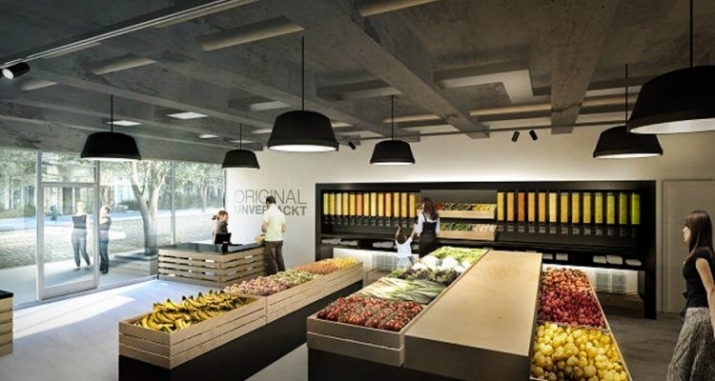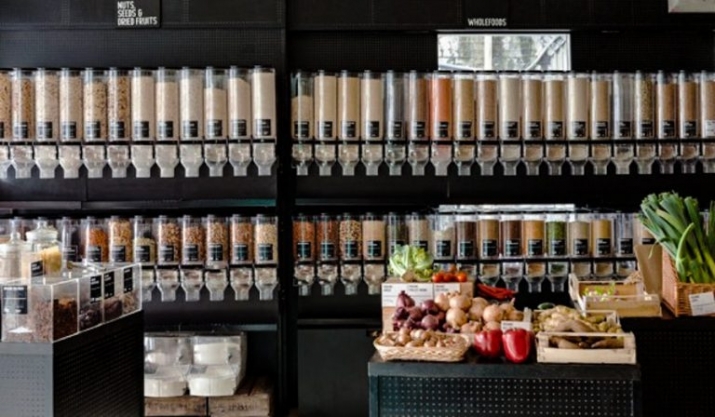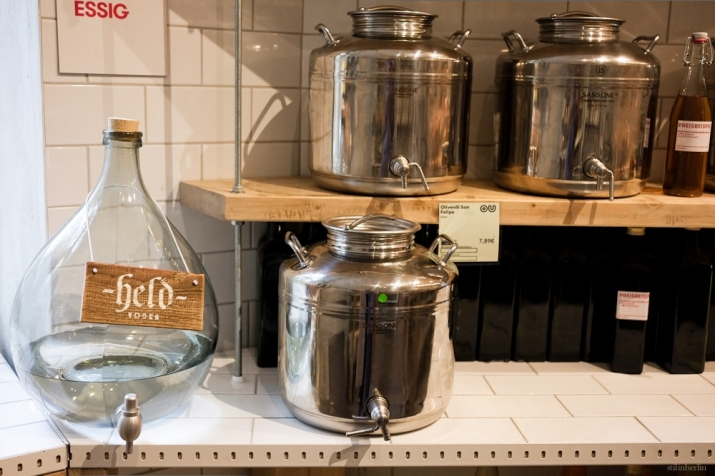NEWS
Rise of the Zero-waste Supermarket
 Original Unverpackt in Berlin. From theplaidzebra.com
Original Unverpackt in Berlin. From theplaidzebra.comWhile eschewing the plastic and taking your own shopping bag to the supermarket is certainly a step in the right direction, environmentally speaking, a growing number of ecologically-minded entrepreneurs around the world are taking a more committed stance on sustainability by moving to eliminate packaging entirely.
Luxembourg-based Eurostat, a branch of the European Commission, estimates that 156 kilograms (344 pounds) of packaging waste is generated each year for every person in the European Union, while in 2011, government statistics say, the UK alone produced nearly 11 million tonnes of packaging waste. Fortunately, some businesses are taking a leaf from a more traditional book, applying a practice found in many humble wet markets around the world, as a growing number of shops in Europe ask patrons to bring or buy their own reusable containers for the products they purchase—no more cellophane, plastic bottles and boxes, or Styrofoam trays.
In Berlin, Original Unverpackt (Original Unpackaged) opened in 2014, stocking mostly organic produce and carrying no products marketed under popular brands. The store sells more than 350 products, which it carries in bulk bins, drums, and jars—even shampoo and milk are sold from bulk dispensers. Customers can bring their own containers, or buy reusable holders from the store to transport their purchases, which are sold by weight. While paper bags are available for new customers to carry dry goods, most shoppers have quickly caught on and bring their own reusable cotton pouches.
 From the plaidzebra.com
From the plaidzebra.com“Here, the customer only takes what they need,” say founders Sara Wolf and Milena Glimbovski. “We’d like to offer an alternative way of shopping—one where we offer everything you need but you won’t find hundreds of different types of body lotion or olive oil.” (The Guardian)
LØS Market, Scandinavia’s first zero-waste supermarket, is set to open in the Danish capital Copenhagen this summer, stocking more than 400 organic products and also with an emphasis on local produce. Inspired by Original Unverpackt, customers will bring their own containers, although compostable paper bags will be available for dry goods, while liquids such as wine, oil, and soap will be poured into free empty bottles, to be returned by customers and reused after being washed in the store.
The trend towards more sustainable consumption has also made its way across the Atlantic. In Canada, marine biologist Brianne Miller plans to open the country’s first such outlet, Zero Waste Market, this summer in Vancouver, after testing the concept with monthly pop-up markets. In addition to eliminating packaging, Miller plans to stock mainly local, organic products, and even the store’s suppliers will make deliveries with reusable containers.
Having witnessed the habitat degradation caused by pollution and climate change, Miller said, “I started to realize that a lot of those problems are either directly or indirectly linked to our food system. I was seeing these issues first hand and wanted to actually do something about it.” (Huffington Post)
 From stilinberlin.de
From stilinberlin.deIn Austin, Texas, in.gredients became the first packaging-free, zero-waste supermarket in the US in 2011, determined to offer a less wasteful alternative to the multiple problems caused by the modern food industry. “Truth be told, what’s normal in the grocery business isn’t healthy for consumers or the environment,” said co-founder Christian Lane. “In addition to the unhealthiness associated with common food processing, nearly all the food we buy in the grocery store is packaged, leaving us no choice but to continue buying packaged food that’s not always reusable or recyclable. Our goal is to reduce waste and promote health by ditching packaged and overly processed food altogether.” (in.gredients)
The zero-waste supermarket model not only addresses the pervasive problem of excess packaging, it also aims to reduce the issue of food wastage. According to the World Bank, anywhere from a quarter to a third of the world’s food production goes to waste each year, and in developed economies, much of that waste is due to consumers who purchase more food than they’re able to eat before it goes bad. By offering loose products from drums, jars, and dispensers, customers at zero-waste markets are able to “pour” their own rice, nuts, beans, and oil rather than buying more than they need in prepackaged quantities.
See more
Packaging-free shopping on the rise in Europe (Zero Waste Europe)
This zero-waste grocery store has no packaging, plastic or big-name brands (Plaid Zebra)
Zero-Waste Supermarket Coming To Vancouver (Huffington Post)
Scandinavia’s First Zero Packaging Supermarket Opens This Summer (foodtank)
in.gredients Crowd-Sources Funding, Aims to Become First Package-Free, Zero-Waste Grocery Store in Nation (PDF file, in.gredients)
Berlin duo launch a supermarket with no packaging (The Guardian)
This “zero-waste” supermarket got rid of all food packaging (Salon)














